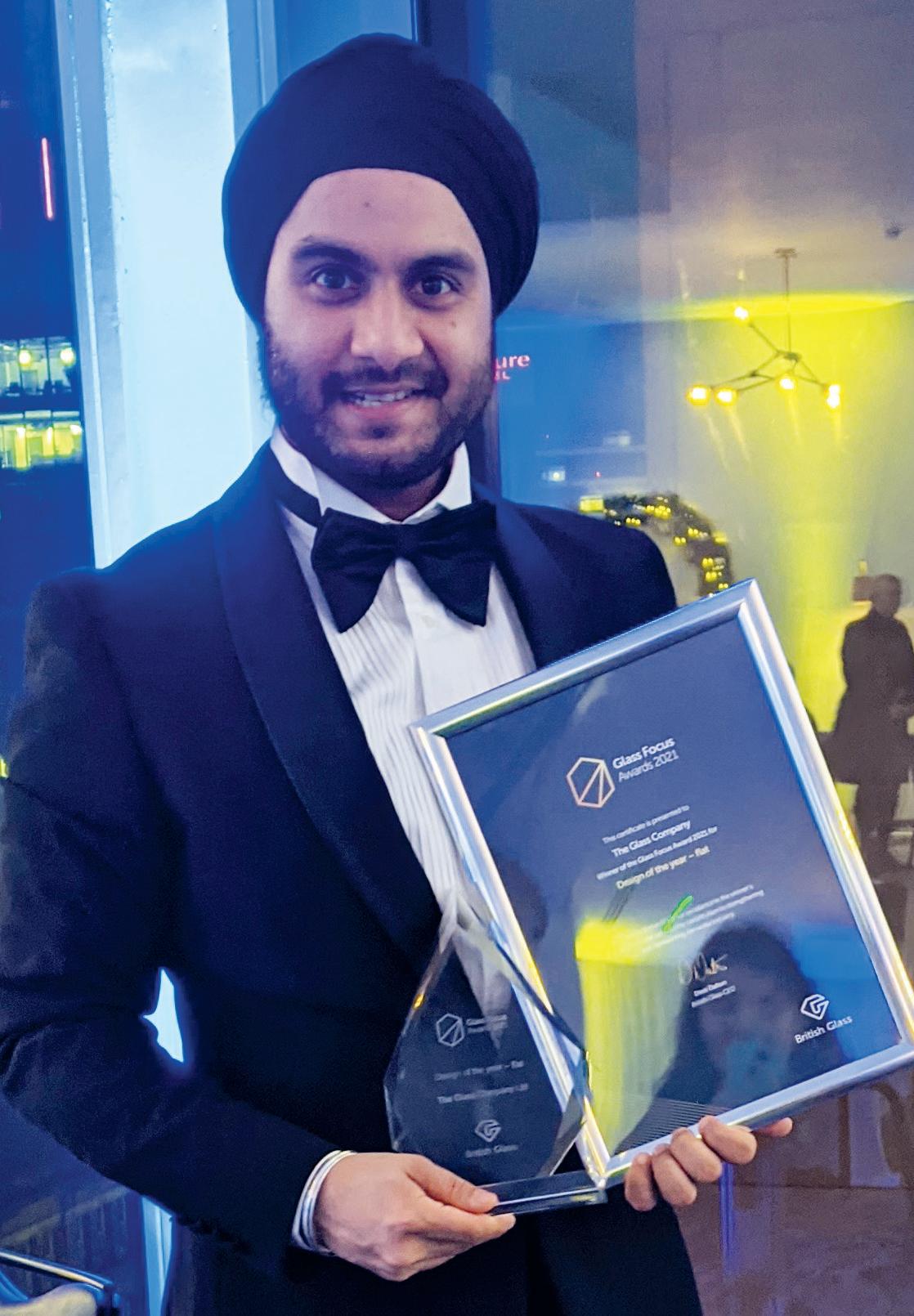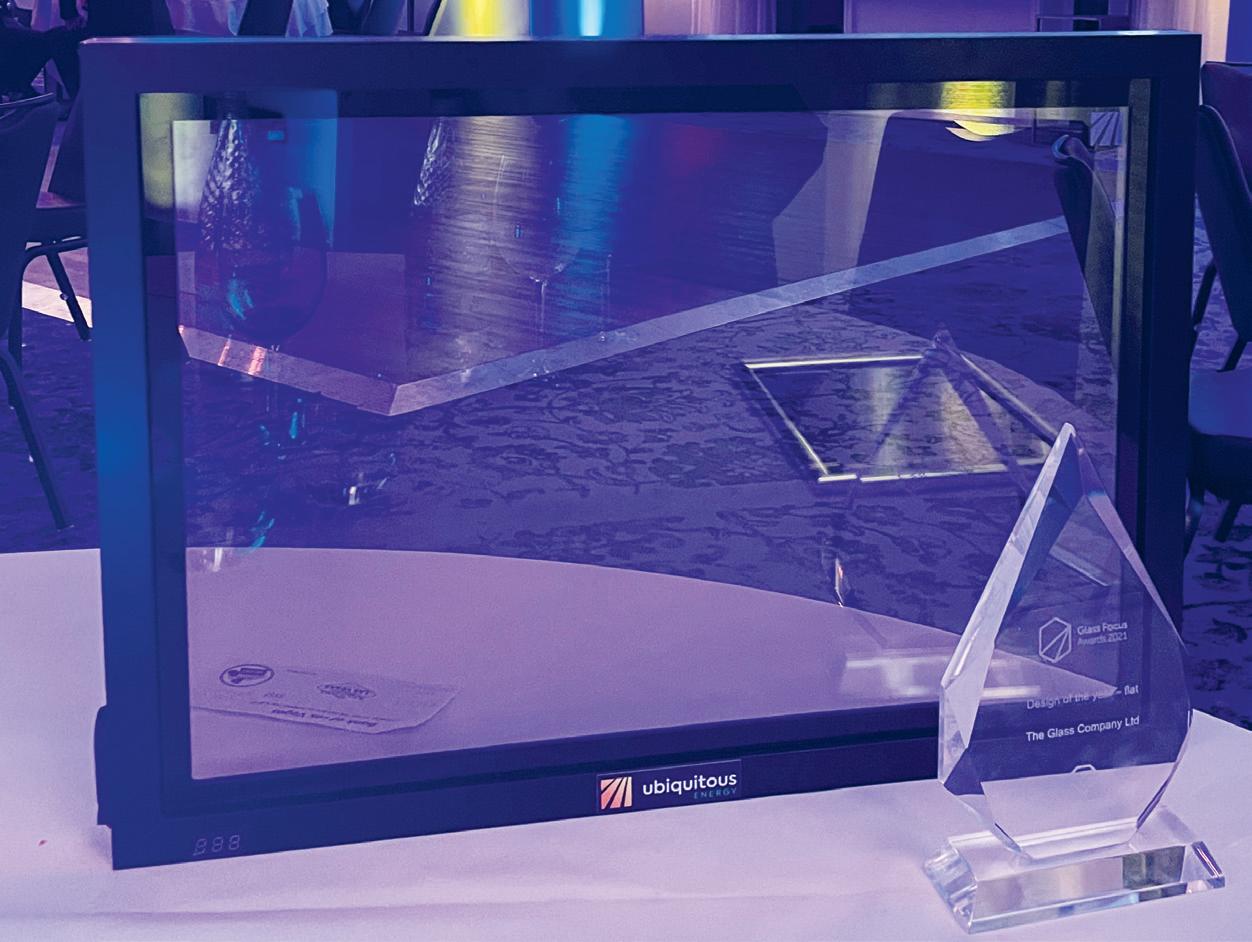
5 minute read
Company profi le
The Glass Company: from humble beginnings to award winner


The Glass Company won Design of the Year in Flat Glass in conjunction with Ubiquitous Energy coating at the recent British Glass Focus awards. Jess Mills spoke to owner Sanmukh Bawa* about his upbringing into the world of glass and how sustainability infl uences the group’s operations.
Like most children, Sanmukh Bawa (pictured inset with the British Glass award) used to race home from school - but not to play video games or watch TV after a day of learning.
Sanmukh was keen to see the production of glass. The Bawa family owned a glass factory, and Sanmukh was regularly enchanted by it.
“I used to go straight from school as it was so exciting to see the production magic within the facility. The smell of silicon from insulated glass units still takes me back to that time as a child.”
Sanmukh is the fourth generation glass person in his family, after his great-grandfather started the company in 1961. The company was later established in 1983, under the names SafeMaxx and Innovative Glasses, in New Delhi and Gurgaon, India.
At fi rst, the company simply used window glass and timber, before Sanmukh’s grandfather, Mr Charanjit Singh Bawa, brought in aluminium and steel. Sanmukh’s father, Bhupinder Singh Bawa, then introduced curved glass to the company in 1998, making Innovative Glasses one of the fi rst companies in India to bring curved glass to the market. It still remains as one of the biggest producers of curved glass in India today.
With this upbringing, it’s unsurprising that Sanmukh’s career has been entirely dedicated to glass. In 2012, he started as a Project Engineer for Eckersley O’Callaghan before becoming the
� Ubiquitous Energy Headquarters in Redwood City, California.
Technical Director of G-Smatt Europe in 2017.
As well as this role, and running The Glass Company (TGC), Sanmukh has been a Technical Committee Member of the British Standards Institute (BSI) since 2019 due to his expertise. He believes he owes all of this experience to his family.
“Before I said ‘Papa’ or ‘Mama’ I used to hear the word ‘glass’ – I think it’s in my DNA to be here. Now, if I look back, I’m so grateful to my greatgrandfather for stepping into the industry.
“If I were somewhere else, I would still eventually find my path back to glass because I think I was made for it.”
Glass Focus Awards
TGC was named Design of the Year in Flat Glass in conjuction with Ubiquitous Energy coating, which the judges believed to be a revolutionary development in the area of glazing.
The transparent solar coating absorbs and converts non-visible light, such as ultraviolet and infrared, into electricity. It can also be applied directly onto glass, such as windowpanes, using standard coating equipment.
Sanmukh said: “It was a very humbling experience to win an award at the prestigious British Glass Awards. The other nominees were also really innovative technologies so it was nice to share the stage with them.”
Mr Bawa founded TGC two years ago. The design, consultant and procurement practice supports architects, contractors and corporations with innovative glass products. The company is an advocate for new and sustainable technology, such as building integrated photovoltaics (BIPV) and electrochromic glazing for BSI glass.
TGC was also nominated for Design of the Year in Flat Glass for its G-Smatt media glass, which Mr Bawa classifies as ‘the future of technology’ alongside the Ubiquitous Energy coating. On the media glass, Mr Bawa said: “G-Smatt is a fully transparent smart glass, capable of displaying any photograph, video or digital art. It can convert a whole building into a very immersive experience.”
The company is currently expanding in the UK, although Mr Bawa still returns to his roots in India for curved glass production or special projects. He said that TGC plans to use the curved glass furnaces from his family’s site to reuse and recycle glass, as well as focusing more on upcycling.
Ubiquitous Energy Coating
The technology that would become the Ubiquitous Energy coating was invented in 2010 at the Massachusetts Institute of Technology (MIT) and Michigan State University. Its three founders, Vladimir Bulovic, Richard Lunt and Miles Barr, theorised a solar device that could capture nonvisible light.
In 2011, Ubiquitous Energy, which was founded the same year, patented the concept of selective absorption. Mr Bawa outlined what “I’ve been involved with COP26 and the UN sustainability goals, and felt that we all need to do our little bit for the environment. And, to me, this technology is my little bit to give back to society.”
happened next: “In 2012, Ubiquitous Energy had a small prototype which basically showed the functionality – it worked. And ever since then, the company’s gone through a process converting a small-scale technology into a more realistic pilot project, which is being done now.
“The future plans for 2023 and 2024 are to have a full-scale, commercial set up. […] We’ll be able to do a standard façade glass size of 1.5m wide by 3m high. Eventually, that is where we expect the buildings will have the right momentum to start absorbing.”
The amount of power the coating can generate is dependent on the area. The coating absorbs and converts 3-5% of the energy from non-visible light, a percentage Mr Bawa believes is ‘game-changing’.
TGC has introduced the Ubiquitous Energy coating to markets in the UK, Europe and Middle East. Mr Bawa said now is exactly the right time for the technology to be out there.
“We all have been through climate change, in some shape or form, during the last year. This year is apparently one of the worse for climate change so far.
“I’ve been involved with COP26 and the UN sustainability goals, and felt that we all need to do our little bit for the environment. And, to me, this technology is my little bit to give back to society.”
� Glass panel with Ubiquitous Energy coating, the only fully transparent solar technology that generates electricity from non-visible light.
The Future
TGC is working towards commercialising the Ubiquitous technology for application on buildings. Mr Bawa said the company is currently in talks with architects and government officials to set up a variety of projects around the world – all of which will come from the company’s pilot factory in the US.
“At the moment, we are getting our glass technology specified for projects starting in 2025/26. So, by the time the projects are on site, our full-scale production of the glass will be available.”
Mr Bawa also outlined that there will be several pilot projects within the next two years, and a larger installation in the years after. �
*Founder and director of The Glass Company, London, UK https://theglass.company/











